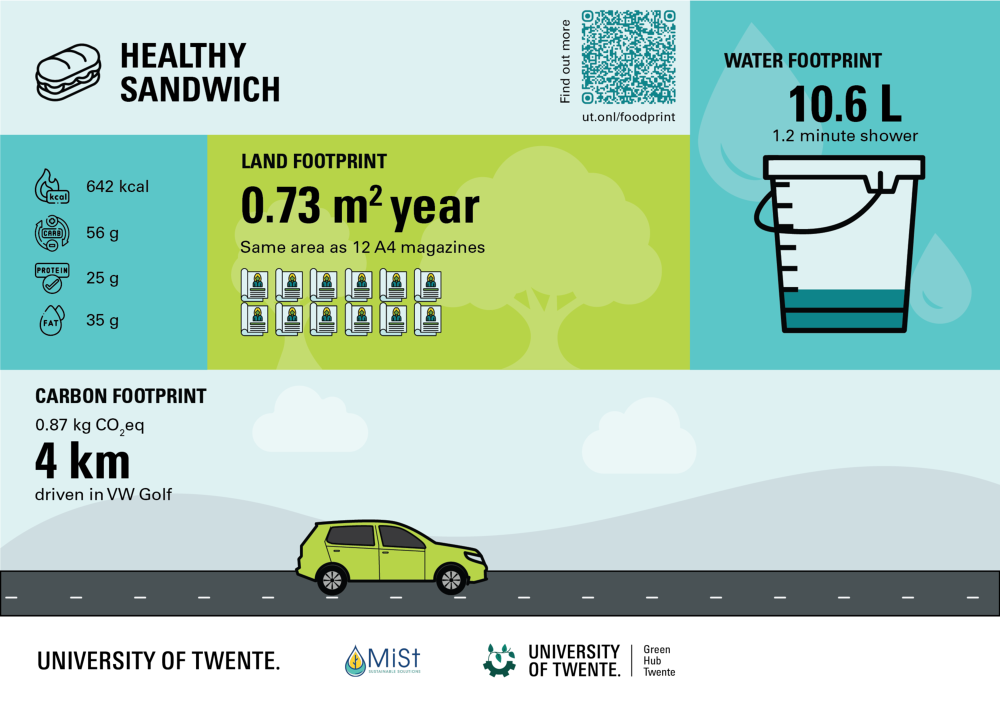University of Twente and caterer Appèl are working towards the menu of the future. UT wants to halve the environmental impact of food and drinks served on campus by 2030. Several initiatives contributing to this goal have been set up over the years. In 2024, the SEE programme initiated a pilot in collaboration with caterer Appèl and MiSt Sustainable Solutions.
The goal was to educate and inform the UT community about the environmental impact of their food choices. Specifically, the CO2, land and water-emissions associated with different types of sandwiches. For this pilot, the five best-selling sandwiches were targeted for the duration of a month. Next to the food choices, a sign showed the ‘footprint’ of the particular sandwich. When more people make sustainable choices, our food impact as a university lessens.
Setup
UT has been in contact with Appèl, who then provided data on five popular sandwiches. Appèl made sure to pick five different types of sandwiches, to highlight the differences in impact. Appèl provided UT with all data regarding the impact per sandwich, including weight and all the ingredients. MiSt Sustainable Solutions then used this information to calculate the impact of each sandwich in terms of CO2 emissions, land use, and water consumption, as well as their nutritional values.
This provided clear insights into the environmental impact of the sandwiches, helping people make more sustainable choices in UT’s canteens.

a future-proof visualisation, created by the Green Hub, was used during the pilot.
Results
The pilot provided some nice insights and results. We reached a target group, of which the majority were students on campus. Staff members were also a significant segment of the target group. Over 90% of participants reached at the canteens on campus expressed their interest in reducing their environmental footprint through their food choices.
In addition, over 36% of the participants mentioned that they changed their food option after checking the visualisations next to the best-selling sandwiches. This shows that a significant amount of the UT-community can be inspired to pick the sustainable food option with help of these visualisations.
Continuation
Participants were asked to share their feedback on the visualisation designs. Green Hub Twente used this feedback to create a future-proof design. After two phases of data collection and various reiterations, the design was finished. UT will use this design to expand the visualisation options at the canteens in the future. Furthermore, 61% of participants emphasized that they would like to see more vegan options at the canteens as well as a clear indication of ingredients.
And there is demand for more options; 88% of participants in the pilot emphasized that they would like to see the visualisations expand to other dishes. The SEE programme is looking into continuing this pilot, focusing on warm dishes and drinks from the coffee machines this time. More to come!
Sustainability at UT
Sustainability is an important priority area of Shaping2030, the University of Twente’s strategic plan. In addition to finding sustainable solutions for societal issues, the UT wants to set a good example of what it means to be a sustainable organisation. To reach this goal, the ambitions of Shaping2030 need to be put into practice. Many members of the UT community are hard at work translating the sustainability objectives into our work on campus – transforming the way we work, teach, learn, travel, build and more. In this series, we invite them to talk about what motivates them, what the role of sustainability is in their day-to-day work, and what they would like to achieve at our university.
Want to find out more about sustainability at UT? Please go to utwente.nl/sustainability.





